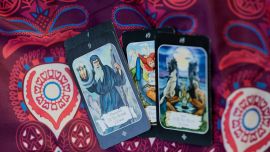Twenty years later and they still talk regularly: 9/11 survivors and relatives of victims have formed strong friendships through support groups that have proved effective antidotes to their trauma.
Jelena Watkins, a Londoner of Serbian origin, lost her only brother – a financial software engineer – in the ruins of the World Trade Center on September 11, 2001.
She struggled for years to find support until in 2004 she joined a group of four or five grieving siblings like her who spoke first by phone and then by Skype.
"It really did start a great friendship," Watkins told AFP. "Siblings are usually not the first in line in the hierarchy of loved ones. Our needs were very profound."
Initially, they talked a lot about the difficulties of grieving when their departed had not been formally identified.
"It was kind of a conversation killer to talk about identification of body parts" with regular friends, she recalled.
The group met for the first time at the inauguration of the 9/11 memorial in New York on the 10th anniversary of the attacks in 2011.
Their meetings then became scarce, before the group finally dissolved. But Watkins remains in contact with two members in California and spoke to them throughout the pandemic.
Matt Winter's life was also turned upside down by the attacks – he lost 87 colleagues in the Twin Towers.
'People don't understand'
The then-33-year-old financial services worker was heading to work for business meetings after a trip to California when the planes crashed into the towers.
Winter was so traumatised – colleagues stuck in the towers left him notes and he suffered guilt for not being able to help – that he cancelled his engagement scheduled for a few days later. He has never really worked again.
It wasn't until last year that Winter, who lives in San Francisco, found a suitable group in which he said he could finally say "things that even therapists or best friends don't know."
For Winter, who devoured books on other tragedies in history, the experience is comparable to that of the survivors of Hiroshima or the Holocaust.
"It's a common mistake for survivors of that kind of trauma to minimise their experience because some people had it worse," he told AFP.
Annie Witlen, who worked close to the Twin Towers and volunteered at Ground Zero after the attacks, only recently joined a support group but is already feeling the benefits.
She said that after 20 years people outside of the group say things like "aren't you over it now?"
"People don't understand, to see something like that go to the ground unless you were there and witnessed it," Witlen explained. "It's like being an alcoholic and somebody being drunk and falling down and you not being able to understand it if you are someone who is not an alcoholic."
Witlen, like others, would like to see these groups receive funding so they can continue.
The Voices of 9/11 association, created after the attacks to help the families of the victims, has been relaying that message, according to founding director Mary Fetchet.
The association has organized more than 2,100 groups, including those of Watkins and Winter.
Before her son Bradley was killed in the Twin Towers, Fetchet was already sensitive to the psychological repercussions of terrorist attacks.
The social worker had heard the mother of a victim of the Oklahoma City bombing, in which 168 died in 1995, recount an outbreak of depression, domestic violence and drug addiction in the city following that attack.
Funding call
In October 2001, Fetchet brought together relatives of victims of 9/11 at her home in Connecticut and formed the first formal groups at the end of 2002.
Designed to maximise their shared experience, the groups of parents, spouses, siblings and mothers of firefighters who died each had a dedicated social worker.
Most have ceased formal meetings but the ties between its members have remained, she said. Those relationships tighten as every anniversary approaches or when news rekindles trauma, such as the pandemic or the January 6 storming of the US Capitol.
All of the experience accumulated since 2001 – from information sharing and psychological support to how to pursue compensation – is also used to support victims of other attacks around the world.
Voices works particularly close with Invictim, an international organisation supporting victims of terrorism, and the Canadian government to help families of people caught up in attacks.
"I think we have a long way to go before people working in the field really understand what victims' families and responders and survivors need after a tragedy," said Fetchet.
related news
by Catherine Triomphe, AFP























Comments